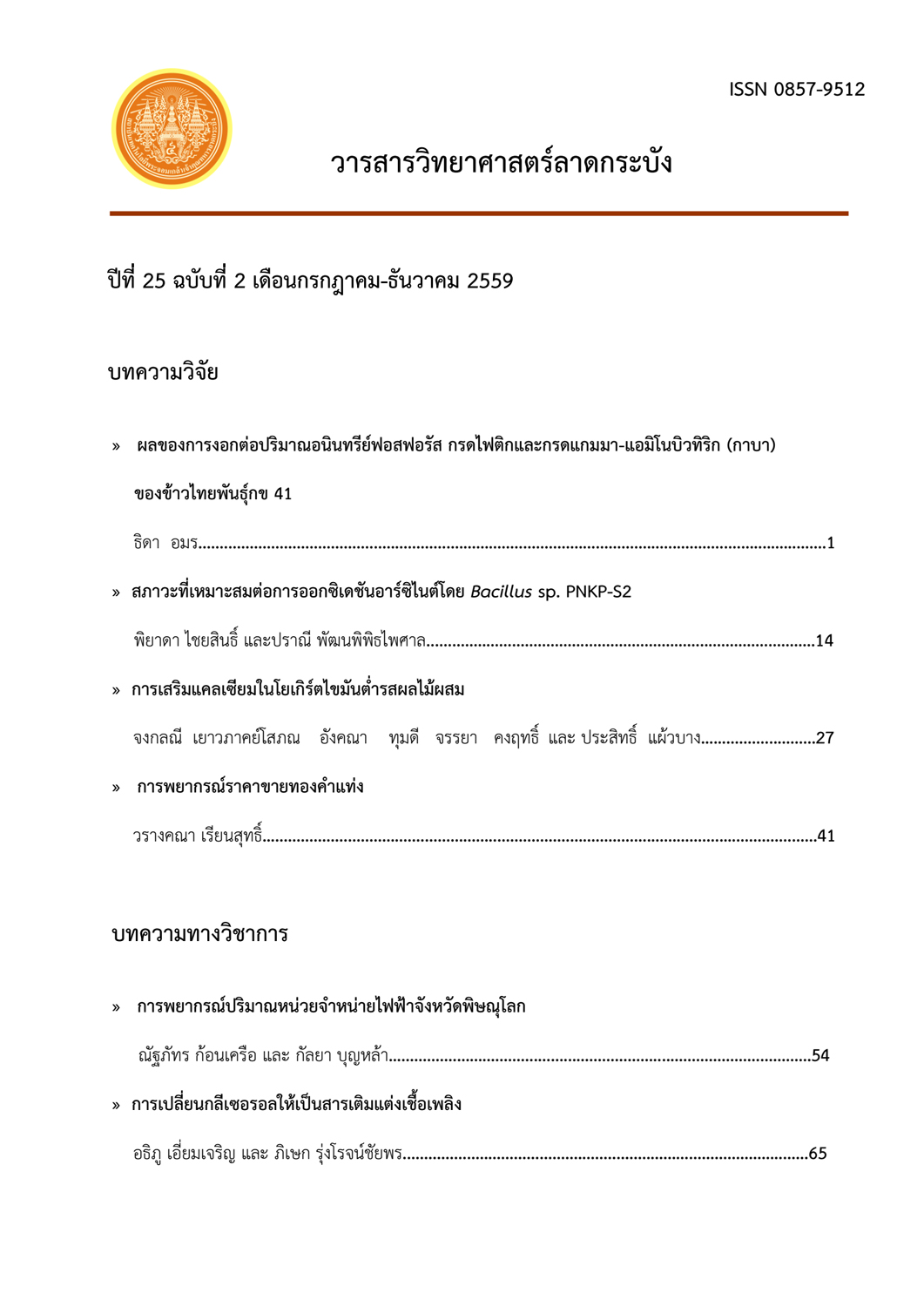สภาวะที่เหมาะสมต่อการออกซิเดชันอาร์ซิไนต์โดย Bacillus sp. PNKP-S2
Main Article Content
Abstract
บทคัดย่อ
ทำการเพาะเลี้ยงแบคทีเรียออกซิไดส์อาร์ซิไนต์ Bacillus sp. PNKP-S2 ในอาหารเลี้ยงเชื้อ enrichment and growth medium (EG medium) ที่มีความเข้มข้นของโพแทสเซียมอาร์ซิไนต์เริ่มต้นเท่ากับ 100 ไมโครกรัมต่อมิลลิลิตร ภายใต้สภาวะแวดล้อมต่างๆ เพื่อศึกษาสภาวะที่เหมาะสมในการ
ออกซิไดส์และลดความเป็นพิษของอาร์ซิไนต์ ผลการทดลองพบว่าสภาวะที่เหมาะสมในการออกซิไดส์
อาร์ซิไนต์คือทำการเพาะเลี้ยง Bacillus sp. PNKP-S2 ในอาหารเลี้ยงเชื้อ EG medium ที่มีความเข้มข้นโพแทสเซียมอาร์ซิไนท์ 100 ไมโครกรัมต่อมิลลิลิตรและโซเดียมอะซิเตท 15 ไมโครโมลต่อลิตร ที่พีเอชเริ่มต้นของอาหารเลี้ยงเชื้อเท่ากับ 6.5 หัวเชื้อเริ่มต้น 6 เปอร์เซ็นต์ นำไปบ่มที่อุณหภูมิ 35 องศาเซลเซียสบนเครื่องเขย่าความเร็ว 150 รอบต่อนาที เป็นเวลา 96 ชั่วโมง ทำให้โพแทสเซียมอาร์ซีไนท์ลดลงเหลือเท่ากับ 0.75 ไมโครกรัมต่อมิลลิลิตร คิดเป็นอัตราการออกซิเดชันเท่ากับ 99.25 เปอร์เซ็นต์ ผลการทดลองที่ได้ชี้ให้เห็นถึงศักยภาพของแบคทีเรีย Bacillus sp. PNKP-S2 ในการออกซิไดส์อาร์ซิไนต์เป็นอาร์ซิเนต จึงสามารถเป็นทางเลือกหนึ่งในการนำไปใช้พัฒนาเพื่อการบำบัดน้ำใต้ดินโดยวิธีทางชีวภาพต่อไป
คำสำคัญ : แบคทีเรียออกซิไดส์อาร์ซิไนต์ การออกซิไนท์อาร์ซิไนต์ การบำบัดอาร์ซินิคโดยวิธีทางชีวภาพ การฟื้นฟูสารมลพิษทางชีวภาพ
Abstract
As (III)-oxidizer, Bacillus sp. PNKP-S2 was cultured in enrichment and growth medium (EG medium) containing of 100 µg/ml initial potassium arsenite under various conditions in order to investigate the optimal condition for oxidation and removal of arsenite by this bacterium. The result showed that the optimization of As (III)-oxidation was obtained by cultivation of Bacillus sp. PNKP-S2 in EG medium containing potassium arsenite and sodium acetate at 100 µg/ml and 15 µmol/l, respectively, with the initial pH of 6.5 and inoculum size of 6 %. The incubation was performed at 150 rpm of rotary shaker at 35oC for 96 hr resulting in the concentration of potassium arsenite reduced to 0.75 µg/ml or 99.25% of the oxidation rate. This study indicated that Bacillus sp. PNKP-S2 could be an alternative strain for bioremediation of groundwater in the near future.
Keywords: arsenite-oxidizing bacteria; arsenic-tolerant bacteria; oxidation of arsenite; bioremediation

